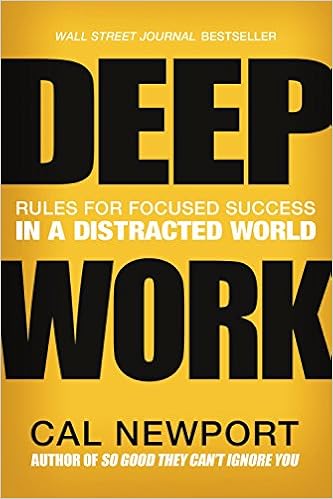Context
Upon completing Why We Sleep: Unlocking The Power of Sleep and Dreams by Matthew Walker, I promptly picked up a new book: Deep Work: Rules for Focused Work in a Distracted World by Cal Newport.Overall, the book positively impacted me in 2 ways, yet at the same time I had quite a bit of "problems" with between his logical gaps and boasting of accomplishments or anecdotal evidence to his methods. Before I continue, let's quote the book's definition of Deep Work - "Professional activities performed in a state of distraction free concentration that push your cognitive ability to their limit. These efforts create new value, improve your skills, and are hard to replicate"
Its definition is highly similar to that of flow(link to wikipedia), but slightly more specific.
Let's focus on the goodies first.
How Did The Book Positively Impact Me
For one, the book drilled deep in why Deep Work is extremely hard in the modern world. The temptations and distractions are simply ubiquitous, and might not even be a matter of "personal entertainment". Examples include unproductive meetings, checking / forwarding / writing emails that are not time or business critical, or even just being "highly available" for your colleagues in answering questions or a ping in any sort of instant messaging service (Lync, Slack, etc).While I don't necessarily agree on all the points on how best to achieve Deep Work regarding some methods or all the arguments on why it is important (especially over other things), it still paints a bleak picture for those who want any amount of Deep Work for any reason. Thus it motivated me to take this issue much more seriously than before, and work at it more actively.
For two, the book did have good pragmatic suggestions backed by scattered and moderate to weak scientific evidence. I will address the book's problem at a later point, but in short - it peaks on great highs but drops to meh lows at various points in the book for me because the author tried too hard to fit in all his stories and narratives, even on topics that's not well researched or overly niche to his own profession as a University Professor / Researcher.
One aspect that I've figured out myself through the years and have talked about in my various platforms before is the fact that the ability to focus and do work is a skill in itself, not something one can easily turn up or down by motivation or will. This is discussed in length and better in the book and rang true to me the most. Before reading the book, I was more concerned with my work habit in having better overall consistency (since I lacked), yet this book provided more meaningful steps in building an efficient work flow as well as training my ability to resist distractions and do focused work over longer periods of time.
I now believe my biggest problem isn't the inconsistency, but rather my very low amount of "Deep Work" carried out per day. Consistency does help to develop Deep Work routines, but one can also be consistently doing shallow work. In short - practice doesn't make perfect, practice makes permanent. Now I'm deliberately building a type of consistency which can help me get more done with equal if not less time spent.
More Specific Changes - Entertainment / Relaxation
Despite the book heavily focused on producing knowledge work, it also mentioned being more deliberate and thoughtful in planning our time and efforts. Including "shallow work" and even in leisure. To maximize our "result" should it be having fun and recharge or take care of mundane things we must thus maintaining a better opportunity for us to carry out deep work schedules uninterrupted at full power. I personally agree and feel the same. Sometimes when I am tired and browse reddit mindlessly for hours on end, it makes me feel very empty and anxious inside, whereas if I mustered the will to play a video game on PC / PS4 I like, it makes me feel alive and more recharged the next day.
I specifically picked video game as an example versus some activity like book reading or music playing where people tend to think of as "useful". It's not about "keep working" or "never stop grinding". It's about being careful and thoughtful with spending time. If I'm tired, I should pick an easier game to play that's story focused like the Witcher 3, or any single player game on a moderate difficulty setting. If I'm feeling alright, then I can indulge in some nail-biting action of Dota2, or challenging games. Either ways, both of these choices bring a lot more joy and value to me than Reddit. Time allocation should closely follow.
To be very frank, I started doing this before reading the book as it has bothered me for a while now (also why I felt deeply to these portions in the book). Moving onto what I truly did change after reading the book, is the practice of focused, uninterrupted work.
More Specific Changes - Extended Focused Work
Currently, I schedule 4:00pm to 5:30pm every single day as a Deep Work time slot. The content can be anything from doing assignments for school to self-learning on professional topics. The shift to "practice the ability to focus" rather than "complete some work" truly changed the result for me. I've only adopted it for a week, so take it with a grain of salt, but I can feel the efficacy and impact.
When I used to force myself to complete tasks before deadline or keep pace, I feel even less motivated than normal (as someone who once often completes tasks no earlier than 30-90 seconds before deadline). Instead of 2 hrs of cram work, I spend 4-6 hrs of fragmented work between online chats and reddit browsing, which seemed to be easily justified as "At least I'm actually doing work on schedule yeah? Heh"
In a way I feel like my earlier shift towards "consistency" and a working life was overall detrimental / net negative. I used to be this dude who had the most intense focus during key times from driving thru mountain roads at great speed for over 60 minutes to pulling shit out of thin air on exams I did not study for nor attend lectures and still pass (Engineering / Math courses, not random multiple choice exam). Yet as I went thru the reality of work life during internships at various top tier software companies, I understood an inconsistent and "cram" work style will not be tolerated, and I started to do "more work" - most of which the book will call "shallow work". The trade off was my, once upon a time, extremely sharp and intense focus for an extended amount of time on things I was deeply interested in or felt absolutely necessary.
I knew it was bad when I felt I needed to focus as unforeseen issues came up during my internship projects, and found myself unable to. I couldn't even muster up the focus I had for passing a random ass midterm early in college, when it's about getting a job with a yearly salary of well above 100k. Wtf?
(The reason was more nuanced than just the ability to do deep work, I had bad sleeping issues too - WHICH IS GETTING BETTER AFTER I'VE READ WHY WE SLEEP: UNLOCKING THE POWE.... yeah I will never stop mentioning it)
Now with a dedicated time slot and a pre-game ritual and all, I'm slowly picking that skill back up. It was always the leap I had to make but I went on the wrong path. I knew what focused deep work is even as a derpy kid, but it wasn't frequent enough, and it wasn't professional enough. Instead of sharpening it further and applying it to my professional work, I went the other route of quantity over quality, of embracing the shallow and the distractions of "appearing busy".
For the past 5 days. I deeply surprised myself in how much I was able to accomplish by a mere 90 minutes per day where I pick a topic and dive deep, turning off my phones and staying away of all sources of distractions. At times it was hard and I caught my thoughts wandering or glancing at the clock more than necessary. Yet I completed assignments, pre-readings, and learning materials I'd normally allocate twice the length of time to cover. A few seemingly harmless Reddit browsing and facebook chats in between truly adds a surprising amount of context switch to the brain and a severe degradation of efficiency beyond my wildest imagination. By removing ~30 minutes of mini-distractions, I also removed ~60 minutes of work time to produce the same result (I'm mentally trying harder to focus as well, so the relation isn't that simple and this is not meant to be a scientific data point).
This is the reality I am living right now though it is a work in progress. I can see this going much further, and hopefully I will write an update in a couple months time.
(Conclusion of my main writing, everything that follows is more of an extra commentary)
A Few Words on the Book's Issues
I believe the book has a great core message in that Deep Work is exceedingly rare and difficult to achieve in the modern world. His proposals or suggestions, however, can range from genius, to "fluff" but good reminders, to impractical for many, to downright wtf. (Hey, you should practice "deep thoughts" with deep effort while doing physical things without mental strain, such as while walking, jogging, or driving. Like solving a difficult math proof in the head. Mhm. Ok. Where do I report so his driver's license can get revoked?)
I think the author tried too hard to cover as much ground as he can and supplement as much material as possible without maintaining a certain level of quality. Having read a few books of similar nature and experienced a few of these topics myself, I find it decently easy to distill great information from other mediocre parts in the book, and thus it positively impacted me in both motivation and practical methods.
I do not worry about people absorbing bad information from the book, because outside of a couple wtf instance, nothing will cause harm. Maybe too strong (especially concerning philosophical ideas and more "meaning of life" narratives) or impractical at times. What I do worry about is "strongly opinionated and enlightened intellectuals" rejecting the amazing ideas and methods presented in the book because of a few shitty parts.
It's a common tendency and flaw to reject everything a person says as soon as the person says anything we strongly disagree or think as "stupid". Thus it is important to recognize this, if one finds similar issues while reading the book. We are trained by school and society to be quick to notice problems and mistakes of others and tend towards a single binary, win-loss / right-wrong / smart-dumb status, a key reason why conversations tend to get derailed quickly during heated arguments. (Book recommendation on topic: Crucial Conversations: Tools for Talking When Stakes Are High)
Cool Topic For Another Day - What is "Talent"?
Cool topic for another blog. I hated people calling me smart / talented as a kid - I felt it was insulting to the efforts I've put in. Looking back it was my amount of focus others mistake as talent since I learnt faster with less time spent. Now I've lost that focus, no one calls me talented - not for work. Intriguing. Is that what "smart" or "talented" literally means to most people?
Thinking about the great musicians, engineers, business people, entrepreneurs, etc I've met in my life thru friends and family, I think so. If true it is very funny to me, that the core of people's perception of "talent" or "smartness" is something of pure practice. And yes, the ability to stay highly focus for longer periods of time is scientifically backed by neurological and psychological science to be a develop-able thing like muscle and will diminish without practice. It is not something we are born with.
The only thing separating the amount of "child talent" to those of the adult world is that it's pretty rare to have a kid spend any amount of time in a highly focused, deep working state, thus even an hour or so a day will likely yield a "smart kid" status. As many and I have. As we grow up however, the expected level of performance becomes higher and much more people develop a baseline ability to do focused work - making the same amount of focused efforts average rather than good. Most top professional will consistently spend 4hrs per day (also estimated to be most human's maximum capability) in a highly focused, deep working state. Those are the ones we recognize as the rock stars or "great talents" in the working world.
So if you think you were a "smart" kid, but got lazy. Maybe consider an alternative reality: you exercised more regularly and stayed fit as a kid, and have since became an obese level of unhealthiness while others started working out later in life, becoming stronger than you ever were as a kid - but in terms of the ability to focus mentally over longer periods of time. That IS smartness, that IS talent, to most people anyway. You can gain it and you can lose it.
Hmm.




